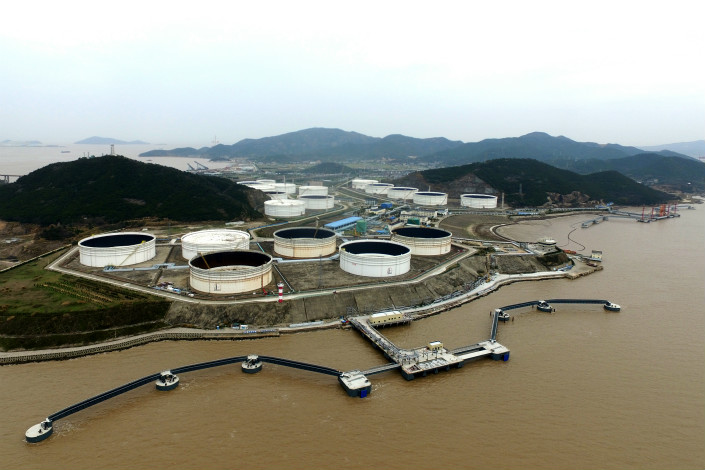China Lures Foreigners to Crude-Oil Futures Trading

China will grant income tax exemptions to overseas investors trading yuan-denominated crude oil futures set to be launched in Shanghai next week in an effort to attract more foreign interest.
The Ministry of Finance, the State Administration of Taxation and the China Securities Regulatory Commission (CSRC) announced on Tuesday that the waiver will apply to both individual and institutional investors. Overseas brokerage firms won’t have to pay income tax on commissions earned on dealing in the new futures contract, they said.
The notice said the exemption for individual investors would apply for three years, but did not specify the time period for institutional investors.
The tax waivers mark Chinese authorities’ latest bid to attract more offshore capital to trade the country’s first crude oil futures contract, which will make its debut Monday at the Shanghai International Energy Exchange (INE), which is affiliated with the government-backed Shanghai Futures Exchange.
China is starting crude oil futures trading and opening the market to overseas investors after years of preparation. Domestic trading started in Nanjing in 1992 and Shanghai in 1993, but the government shut down the markets in 1994 partly due to their volatility.
New benchmark
The country is now the world’s biggest oil consumer and importer, and that has prompted authorities to try to gain more control over the pricing of crude, which is dominated by two benchmarks — West Texas Intermediate, traded in New York City; and Brent crude, which trades on the ICE Futures Europe exchange in London.
“Although Europe and America already have mature crude oil futures markets, their prices cannot accurately reflect the demand-supply relationship in Asia-Pacific,” the INE said in a question-and-answer article on the new crude oil futures market, posted on its website. “The launch of China’s crude oil futures will help to establish a pricing system as a benchmark reflecting the demand-supply relationship of the petroleum markets in China and the Asia-Pacific region more accurately.”
The INE crude oil futures contract will be based on Middle Eastern grades known as medium sour crude oil. It was chosen partly because it has no “authoritative benchmark” on the international market, the exchange said. It is also the main type of crude oil imported by China and neighboring countries, so forming a benchmark of medium sour crude oil will facilitate the development of international crude oil trade, it said.
China’s crude oil imports rose 10% to 420 million tons last year, overtaking the U.S. to become the world’s biggest crude importer, according to data from the General Administration of Customs of China and the U.S. Energy Information Administration. In 2016, nearly half of China’s crude imports were from the Middle East.
China also wants to encourage trading to take place in the yuan rather than the U.S. dollar, the ruling currency in the global oil market. Allowing yuan-denominated futures contracts means Chinese buyers can avoid exchange-rate risk, and the use of yuan by foreign investors will help boost its role as a global currency.
Government officials have made it clear that China wants to play a bigger role in the oil market.
Fang Xinghai, vice chairman of the CSRC, which is in charge of the futures market, said last year: “When the crude oil futures contract is launched at the Shanghai Futures Exchange, Shanghai is likely to become a global hub to trade and price crude oil,” which will largely help Chinese companies better allocate world resources and hedge against market risks.
But authorities also want to avoid excessive volatility and the INE has released a series of trading regulations on its website in the run-up to the March 26 launch. These include setting margins for crude futures trading at 7% of the contract value, and imposing a daily trading band of 5% either side of the previous day’s closing price, although on the first day of trading, the limit will be set at 10% of the benchmark price.
Contact reporter Lin Jinbing (jinbinglin@caixin.com)

- 1China Officials Dismiss Tax Hike Rumors After Tech Selloff
- 2Cover Story: How Gutter Oil Became a Prized Fuel for International Airlines
- 3Prominent Chinese Journalist Liu Hu Detained by Police in Chengdu
- 4Maersk Unit Takes Over CK Hutchison Panama Ports After Court Ruling
- 5China Provinces Set Cautious 2026 Growth Targets
- 1Power To The People: Pintec Serves A Booming Consumer Class
- 2Largest hotel group in Europe accepts UnionPay
- 3UnionPay mobile QuickPass debuts in Hong Kong
- 4UnionPay International launches premium catering privilege U Dining Collection
- 5UnionPay International’s U Plan has covered over 1600 stores overseas




